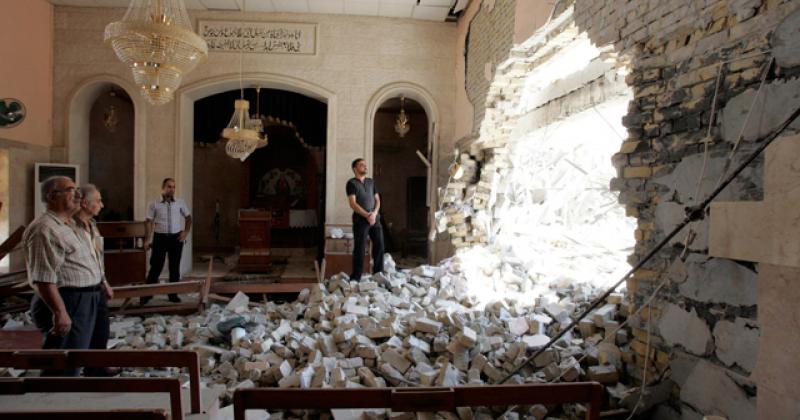Iraqi Christians' faith is not diminished, even as they face exile from their homes and profound suffering, an official with a Catholic pastoral charity has said after visiting Kurdistan, where many have taken refuge.
“The faith is the reason for their lives. And despite the persecution, children wear rosaries around their necks and the people do not hide their tattoos of crosses or their medals that identify them as Christians,” Maria Lozano, adjunct communications director for Aid to the Church in Need, told EWTN News following her August 12-16 visit to Erbil.
“They are not going to renounce their faith, even though that is the reason why they are being persecuted.”
More than 70,000 Christians have been displaced to Erbil from their homes in Mosul, Bakhdida, and other towns in Nineveh Province by the advent of the Islamic State, a recently established caliphate that has persecuted all non-Sunnis in its territory, which extends across swaths of Iraq and Syria.
Lozano traveled to Erbil along with Aid to the Church in Need's president, Johannes Heereman, and the organization's program director, Regina Lynch, on a fact-finding mission to assess the needs of the displaced persons.
One of the most powerful moments during the trip, Lozano reflected, was when she met a 90 year-old woman who said the only thing she could bring with her as she fled from her home was a small package with her prayer books.
“She showed us those books with so much care. They were written in Aramaic by hand. And I thought, 'this is precisely what they want to save: their faith.'”
Aid to the Church in Need's mission to Erbil was done also to “show our solidarity with these people have left everything out of defense of the faith,” Lozano said. “They need to know that we are with them and that we have not forgotten them.”
“The church that is by the refugee camp was completely full, so much that I couldn’t even enter. From outside I could hear them pray and sing in Aramaic … and I thought, 'this is the voice that they want to silence in Iraq.'”
“Something needs to be done so that they can keep praying, praising, and singing in that language and in that land.”
She urged that people “pray that these refugees will receive consolation, the help of God, and the strength to endure everything.”
In an August 19 statement, Heereman called on the international community to “respond decisively now” to the Islamic State, “if we do not want to be silent witnesses to the last chapter of the history of Christendom in Iraq.”
“This cannot remain simply the concern of the Church in Iraq. We must not be silent witnesses to a destruction that is now reaching the scale of a disaster of civilization.”
The Aid to the Church in Need delegation also visited Dohuk, a Kurdish city which is hosting more than 60,000 additional displaced persons.
“We took a more mountainous route passing at times less than 12 miles from ISIS forces,” Lozano wrote in a description of the trip.
“However, there were only a few military check-points through which we passed very easily. In the distance we could see the Christian town of Alqosh, which has for the most part been abandoned by its inhabitants in anticipation of the arrival of ISIS.”
They were accompanied by the Chaldean Archbishop of Mosul, Emil Nona, who was born in Alqosh.
“The archbishop, too, is a refugee, as he was caught outside of Mosul attending a youth meeting in another Christian village when ISIS overran the city in early June. Like so many of his faithful, he had to leave everything behind.”
They visited also Mangesh, a village near Dohuk, where 300 Christian families are hosting an additional 77 Syrian Orthodox families who fled the Alqosh area.
“They were very thankful when the parish priest of Mangesh, Fr. Yoshia Sana, offered them the Catholic catechetical center as a temporary home. At the center, we met their Orthodox priest who expressed his gratitude to Mgr. Nona for the kindness and generosity his people have received,” Lozano said.
“They are still in need of more tents and some ventilators and Mgr. Nona promised to get some for them. Just as in Erbil, temperatures were soaring to more than 110 degrees and in one case seven families were sharing one tent.”
“We saw the cramped conditions under which (the refugees) live and we heard of the generosity of other Christian families, who share their own often humble homes with one or two other families.”
In response to the crisis – in total, there are more than 1.2 million internally displaced persons in Iraq, and more than 9 million displaced Syrians – the U.S. branch of Aid to the Church in Need has pledged more than $1 million to help those countries persecuted Christians.
The funds it has pledged will deliver emergency aid to Iraqi Christians in Erbil and the plains of Nineveh. Aid to the Church in Need is seeking donor support for its goal of $1 million in aid.
“This is not only a problem for the Church but for all of humanity,” Lozano told EWTN News. “We are witnessing a cultural, human and religious genocide, a tragedy of which we are silent witnesses. For this reason we must raise our voices and tell our governments to act against this barbarism.”
